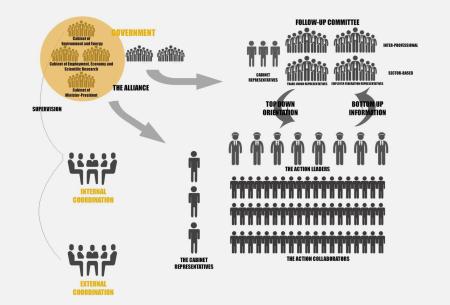
Resource description:
Methodological guide for fostering sustainability transition of key local economic sectors - supporting small local innovative initiatives by governing interaction between public and private actors (or societal niches and public institutions).
Author/Contact:
TURAS
Expert contact: Catherine Vanderstichelen
Requirements:
- An interdepartmental group composed at the very least of Environment, Economic, Employment departments and extended to all departments linked to the sectors involved in the process. In one example, the Environment Employment Alliance in the region of Brus
Advantages:
- The strategy consists of an innovative type of multistakeholder alliance for the transition of specific sectors of the economic activity. It involves a balanced set of participants representing both niche and established actors. An Environment Employment
- Main outcomes: economic benefit, stakeholder integration, process innovation, community empowerment.
Constraints:
- What hampers the transition in many cities is that the pioneers (niche innovation actors, grass-root transition initiatives, innovative start-ups) do not effectively cooperate with established actors such as sectoral federations, trade unions, schools, pu
Uses of this resource:
The cooperation between niche and regime actors can lead to a better understanding of the scope and feasibility of using pioneering economic strategies outside of their initial niche. Established actors often have a better vision of the wider opportunity landscape of which they are themselves a part. Schools and other public institutions, for example, could be an important venue of increasing the scope of local food systems. One the other hand, the regime actors often have vested interests that work against the pioneers. This means that the cooperation of regime actors is necessary to avoid that they obstruct the social-ecological transition. Local authorities can help providing a framework in which niche actors can engage in meaningful and constructive cooperation with actors of the economic establishment. Pioneers and the establishment have to cooperate at eye level in order to overcome power asymmetries and vested interests and to foster mutual learning about economic possibilities, but also the limits of upscaling and regime change.
Additional information:
WHO SHOULD BE INVOLVED?
FACILITATORY (PUBLIC) BODIES:
socio-economic development department; employment department; environmental and sustainability department; strategic planning department
LOCAL TASK FORCE:
entrepreneur; business; local or regional authority; educational organisation; professional expert
SUITABLE FOR:
urban region; (sub-)urban communities
MAIN NECESSARY RESOURCES ARE:
monetary investments; expert knowledge; political back-up; public institutional set-up
Licence:
- Free, no licence
Development stage:
- Full, working product